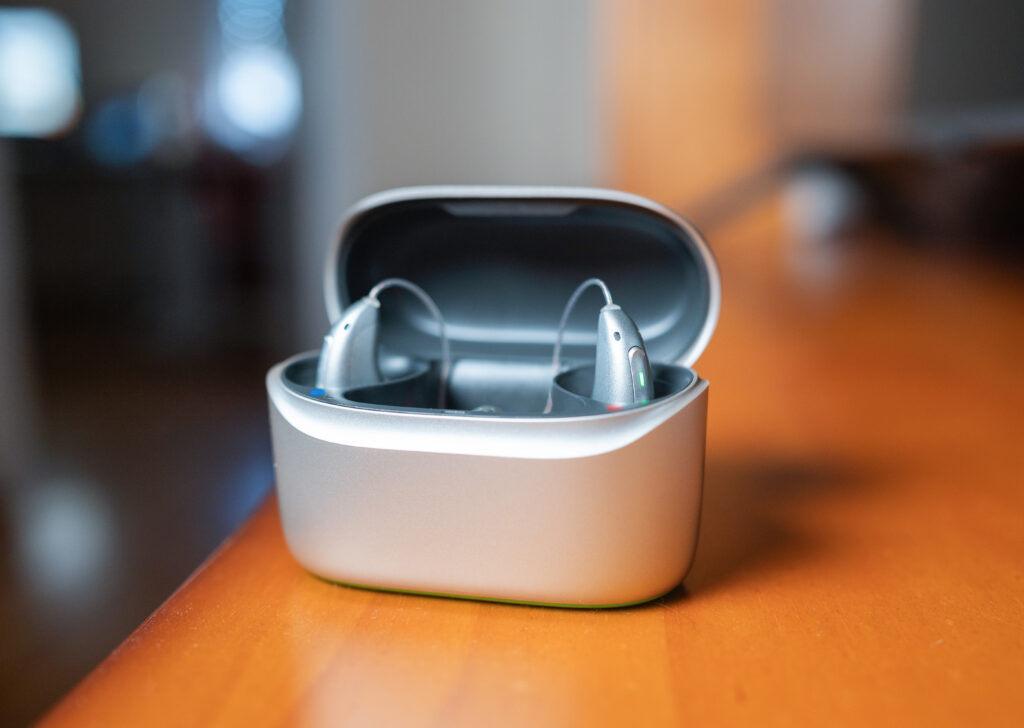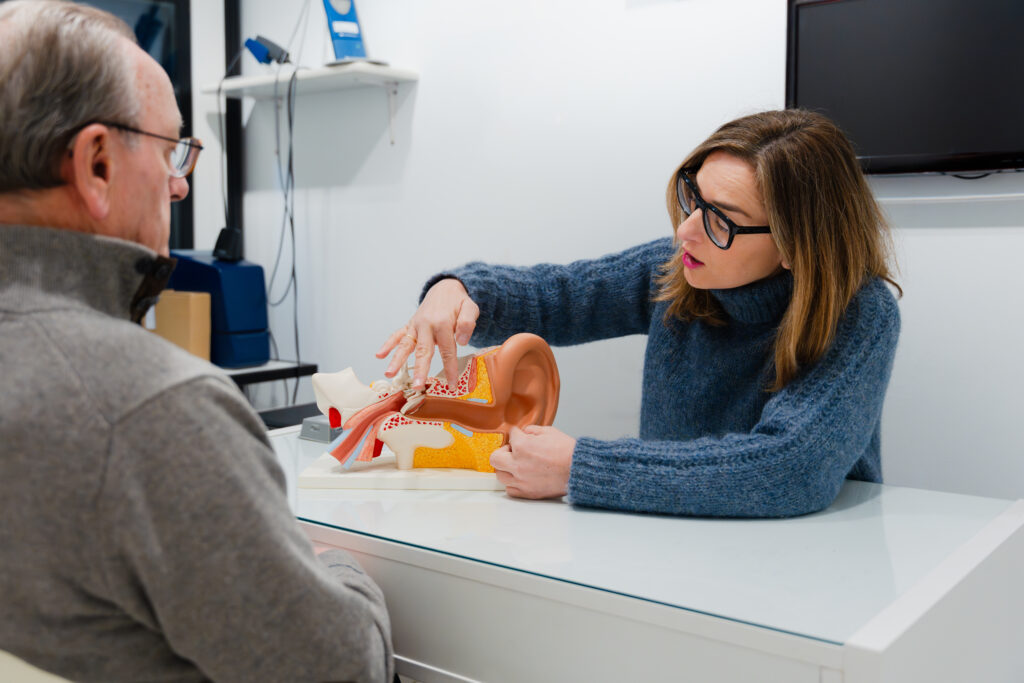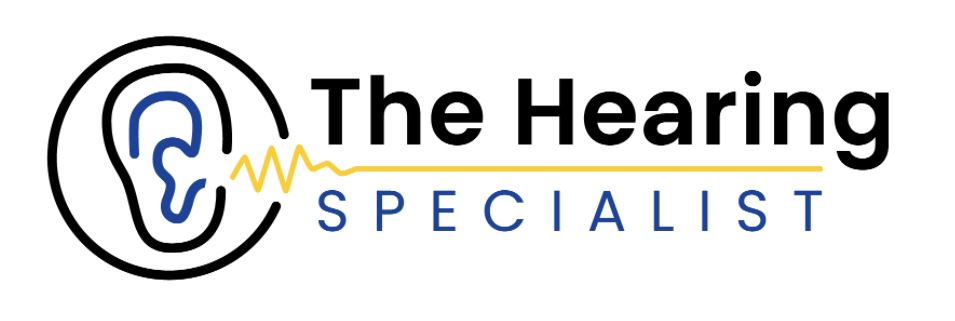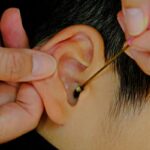Hearing loss affects millions of people in the UK, yet many delay seeking help for years. Whether due to cost, uncertainty, or simply not realising how much they’re missing, it’s common for people to wait until hearing difficulties start impacting daily life.
Recently, over-the-counter (OTC) hearing aids have entered the market as a more accessible and affordable alternative to traditional, professionally fitted hearing aids. The biggest questions we must ask are, how do they compare, and are they worth it?
In this blog, we’ll explore what OTC hearing aids are, their potential benefits and drawbacks, and why professional hearing care still plays such an important role in achieving the best long-term results.
What are OTC hearing aids?
An over-the-counter hearing aid is a device that you can buy directly, either online or in a shop, without needing a prescription or a hearing test. They’re generally designed for adults with mild hearing loss and often allow users to adjust settings themselves using buttons, dials, or smartphone apps.
In the United States, OTC hearing aids are regulated by the Food and Drug Administration (FDA), which helps ensure they meet certain safety and performance standards. However, in the UK, there is currently no formal regulation specific to OTC hearing aids. This means that many self-fit or “direct-to-consumer” devices sold online may not meet the same standards as professionally dispensed hearing aids, meaning the quality and reliability of these products can vary widely.

The benefits of OTC hearing aids
For some people, OTC hearing aids can be an appealing first step towards improving their hearing. One of the main reasons is cost. Since they don’t involve an audiology appointment, custom fitting, or aftercare, OTC hearing aids tend to be far more affordable than prescription devices. This lower upfront cost can make hearing support more accessible to those who might otherwise delay getting help.
Convenience is another advantage. OTC devices can be purchased quickly and easily, often arriving within days. There’s no need to wait for appointments, fittings, or follow-up adjustments, which can make them a tempting option for people living in rural areas or those with limited access to clinics.
For individuals with mild hearing loss, OTC devices can sometimes offer a meaningful improvement in certain situations, particularly in quiet environments such as at home or while watching television. Some of the more advanced models also include features like basic noise reduction, Bluetooth connectivity, or directional microphones that help improve speech clarity.

The drawbacks of OTC hearing aids
Despite their convenience and affordability, OTC hearing aids also come with important limitations. The biggest drawback is the lack of personalisation. Professional hearing aids are fitted and fine-tuned using detailed diagnostic testing and real-ear measurements, ensuring sound is balanced and comfortable for your specific hearing profile. Without this process, an OTC hearing aid may amplify sounds unevenly or excessively, leading to poor sound quality or even discomfort.
Another concern is the absence of a proper hearing assessment. Hearing loss can sometimes be caused by temporary or treatable issues such as earwax buildup, infection, or middle ear problems. Skipping a professional evaluation can mean missing underlying conditions that require medical attention.
OTC hearing aids also tend to perform less effectively in complex or noisy listening environments. While they may work reasonably well in quiet settings, most models struggle in busy places like restaurants or social gatherings where background noise is an issue. In contrast, professionally fitted hearing aids use advanced technology, such as adaptive directional microphones and speech-in-noise processing, to provide much clearer listening in these situations.

Why professional hearing care still matters
For anyone experiencing hearing loss, professional audiological care remains the gold standard. A hearing assessment provides more than just a measure of how well you hear, it helps identify the underlying cause of the loss. Your audiologist can check for earwax, infection, or other medical issues, and ensure that any treatment or hearing solution is tailored to your individual needs.
Once you’ve been properly assessed, your audiologist will recommend hearing aids suited to your hearing profile, lifestyle, and listening environments. They’ll then use real-ear measurements to verify that your devices are delivering the correct amplification across different frequencies, for both safety and comfort. Follow-up appointments allow for fine-tuning and adjustments as your hearing or preferences change over time.
Professional hearing care also gives you access to a wider range of high-performance hearing aids, including models with advanced features like multi-channel processing, feedback management, and smartphone connectivity. These devices are designed to deliver the best possible sound quality and comfort, even in noisy or complex environments.
Most importantly, professional support doesn’t end once you leave the clinic. Audiologists provide long-term care, regular check-ups, maintenance, and advice, so that your hearing health continues to be monitored and optimised over time.

Hearing care with The Hearing Specialist
At The Hearing Specialist, our experienced audiologists are dedicated to helping you hear and live better. We take the time to understand your individual hearing needs, lifestyle, and priorities before recommending any solution. Whether you’re exploring hearing aids for the first time or looking to upgrade from an existing device, we’ll guide you through every step of the process with care and clarity.
Contact us today to arrange your hearing assessment and take the first step towards clearer, more confident hearing with expert support every step of the way.





